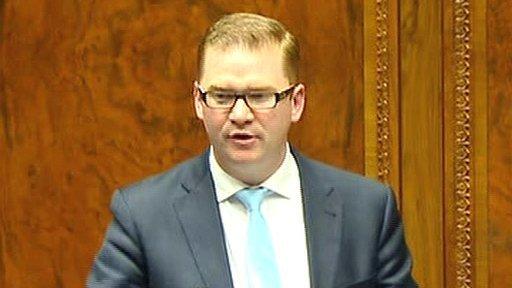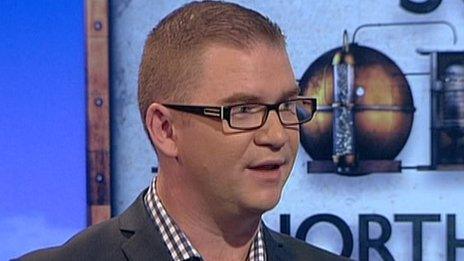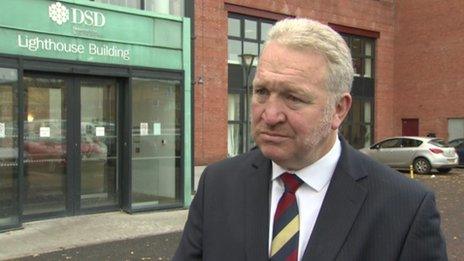Northern Ireland politicians shroud waving over welfare reform?
- Published
- comments

Simon Hamilton has said there will be a £68m cut in the health budget if welfare reforms are not agreed
You don't have to take sides in the tug of war between the DUP and Sinn Féin to acknowledge there's plenty of politics being played over the stalled introduction of welfare reform.
Edwin Poots has told the Nolan Show that, given the existing financial strains on the health service budget, the £68m cut predicted by his colleague, Finance Minister Simon Hamilton, is "simply untenable, as this will directly manifest itself in a reduced level of services provided to patients and clients and would mean that the population of Northern Ireland will not be able to access the same level of health and social care compared to the rest of the UK".
That £68m figure is Mr Hamilton's extrapolation from the £105m fine that the Treasury is due to levy on the executive should it fail to introduce the welfare changes.
Leaving aside the multiple indications that the NHS in Northern Ireland is already in a state of crisis, it's clear the health and finance ministers have deliberately engaged in a bit of crystal ball gazing to make their point.
The Treasury hasn't yet levied any fines over welfare reform, but assuming it does, the NI Executive hasn't yet discussed how any consequent financial pain should be borne by its 11 departments.
They could each take a proportionate share of the fine - which would mean health suffering a £68m cut.
Or they could agree that health, which amounts to around half of the Stormont budget, should be "ringfenced".
This was the approach spelled out by the previous Finance Minister Sammy Wilson when he was dealing with an earlier earlier round of cuts.
Say they don't agree any ring-fencing, and patient safety is considered in jeopardy.
Then ministers might want to reconsider their opposition to levying water charges, which it's estimated will cost the executive, external more than £280m over a three-year period.
Alternatively they could reconsider the cross-party campaign to lobby for a cut in the local level of corporation tax, which if successful could see the local budget reduced - according to some estimates - by as much as £400m.
As the DUP's Sammy Wilson pointed out on the Nolan Show, when you bandy around huge figures they become meaningless.
But I mention these big figures related to water charges and corporation tax not because either option seems at all likely in real political terms, but to emphasise that in any budgetary wrangling there are always political choices to be made.
Whilst the DUP's critics accuse Edwin Poots of "shroud waving" it's clear the health minister isn't the only one playing politics.
DUP politicians claim Martin McGuinness agreed in principle to a deal on welfare reform months ago, but imply he has been overruled by others in the party.
What is clear is that even if Sinn Féin is privately minded to strike a deal on the welfare system at some point in the future, there is no way that's going to happen before the May elections north and south of the border.
Republicans won't want to give their opponents any chance of accusing them of hypocrisy in their avowed battle against "austerity cuts" across Ireland.
Back in February Social Development Minister Nelson McCausland linked the replacement of a Sinn Fein adviser to internal differences over welfare reform, although the adviser, Leo Green, told me himself he was "not at odds with party on policy matters".
Once the May elections are over, will there be a swift deal on welfare reform, before the Stormont parties resume election mode ahead of the Westminster election in 2015?
Or, given the union flag dispute, the mothballing of the Maze peace centre and the failure of the Haass talks, is the relationship between Stormont's two main parties so poisonous that the current logjam will continue?
The initial Treasury fines pale into insignificance beside the projected information technology costs of any Northern Ireland stand alone welfare system.
However, there are also increasing signs of dissension, external about the welfare changes within the Westminster coalition, that may change the equation in the future.
On this issue, the weeks and months after the May elections could prove fascinating.
- Published1 April 2014

- Published16 March 2014

- Published13 November 2013

- Published13 November 2013